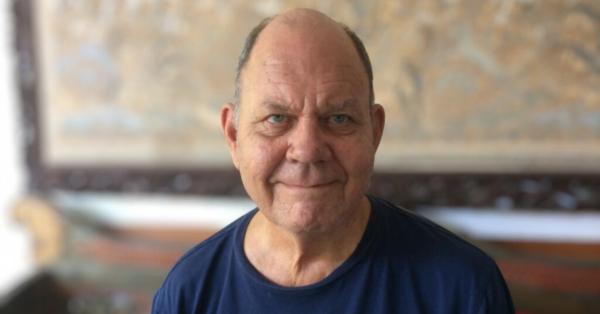
By Tova Green
Ben Connelly, a Senior Teacher at Minnesota Zen Meditation Center, enjoys bringing the ancient Buddhist textual tradition alive. His fourth book, Vasubandhu’s “Three Natures”: A Practitioner’s Guide for Liberation, makes accessible fourth century Yogacara teachings that can enable us to heal and transform systems of harm within ourselves and our communities.
Although Ben offers a stanza by stanza commentary on Vasubandhu’s text, he humbly says, “I do not hope to figure out the meaning of the ‘Treatise on Three Natures.’ I encourage us all to dive into the study itself as a practice of liberation.”
Vasubandhu teaches that the three natures (svabhavas)—the imaginary, dependent, and complete, realized natures—are inherent aspects of all phenomena. The imaginary nature of things is what we think they are. Their dependent nature is that they appear to arise from countless conditions. The complete, realized nature is that they aren’t as we imagine them to be: things that can be grasped or pushed away. The three natures form the backbone of Yogacara philosophy, and by showing us how to see beyond our preconceived notions of ourselves and others, beyond the things that we’re convinced are “true,” they open up a path to personal and communal healing.
Ben draws from a wide range of voices to illustrate Vasubandhu’s teachings, and he continues to learn from those voices. “It’s important to seek out, listen to, read, and hear a diverse array of voices and amplify those voices where I can, without appropriating them.” For example, in writing about the value of imagination, he refers to Black lesbian poet Audre Lorde’s teaching that creativity and difference are essential for liberation. He also includes the voices of scientists Rachel Carson and Steven Hawking, activists Ida Wells, Angela Davis, and John Lewis, as well as Buddhist teachers Shunryu Suzuki, Thich Nhat Hanh, the Dalai Lama, and many more.
“The vision of Yogacara is one that points out how important it is to see the world through different perspectives. It’s most integral to the teaching to include all these voices. It fits. All different kinds of interpretations are possible.”
The Yogacara teachings go back to the Buddha’s teachings and forward to contemporary teachings. “The spirit of the teachings is about looking at different views, acknowledging the differences between them, and appreciating the value, the contribution of each voice.”
In this book, Ben also refers to life experiences that drew him to Buddhist practice and to the early texts. In a chapter titled “Trauma, Perception, and Healing” he writes, “When I first came to Zen practice … I began to shed old fixed views and obsessions. I began to heal … I began to let go of the idea that the harm I had experienced was my fault or insignificant. I began to see that all the harm I had created was my responsibility but not my destiny … I suffered and caused so much harm because of habits of thought, emotion, and embodiment, but they were merely habits—and habits can change.”
Ben came to Zen practice because of his own suffering. “I wanted to be well. I had major mental and behavioral health problems. As I found wellness and stability, I found ways to contribute to community wellness.”
The social and political climate in which Ben wrote this book influenced him. “It’s important to be responsive to the world – and not get caught. What is Yogacara in the early 21st century? Mahayana is a very long view that manifests in the moment. Samsara is very big. We’re invited to see that the patterns of suffering we engage with are vast and long term. We can’t control things.”
Ben lives a couple of miles from the site of the murder of George Floyd and the subsequent uprising. For years he has supported black leadership and joined with multi-faith community groups to transform our approach to public safety. “If I remember that I’m probably going to die in a world where there’s racism—policing in Minneapolis has barely changed since Floyd’s murder—I know I can’t control what happens, but I hope I never give up the work. Yogacara gives us faith that what we do matters even when it looks like it doesn’t.”
“It’s natural for me to talk about agency, altruism, and healing. I was raised that way. What the Three Natures gives me that’s less natural is the idea that liberation is now. I’m not broken and you’re not broken and nirvana is inseparable from samsara.”
Ben’s mother practiced intersectional feminism when he was in elementary school. His parents believed in using the energy of one’s life to support people. His father was a professor, his mother an artist and activist. They talked about social issues at home.
In addition to Ben’s teaching at Minnesota Zen Meditation Center, where he offers classes, leads retreats, and meets with students, he hosts the monthly Queer Dharma Group (he identifies as bisexual).
Ben’s teacher, Tim Burkett (who began Zen practice with Shunryu Suzuki Roshi in 1964) ordained Ben and gave him Dharma transmission. His Dharma name is Gensho (First Sound). In November 2022, Ben conducted his first priest ordination, ordaining four MZMC students as priests.
Ben is currently working on a book related to Hua Yen Buddhism. “Yogacara and Hua Yen are timely because they accord with powerful contemporary thinking about how to heal people and transform us humans and our world in a very beneficial way.”
He is offering a Dharma talk and an afternoon workshop, Imagination, Interdependence, and Liberation, at City Center on April 29, 2023.











